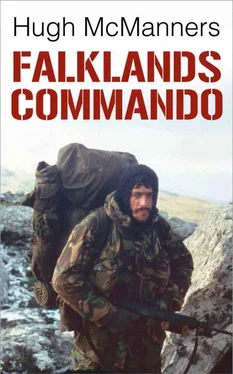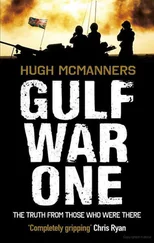Hugh McManners - Falklands Commando
Здесь есть возможность читать онлайн «Hugh McManners - Falklands Commando» весь текст электронной книги совершенно бесплатно (целиком полную версию без сокращений). В некоторых случаях можно слушать аудио, скачать через торрент в формате fb2 и присутствует краткое содержание. Город: London, Год выпуска: 2014, ISBN: 2014, Издательство: Nightstrike Publishing, Жанр: nonf_military, Биографии и Мемуары, на английском языке. Описание произведения, (предисловие) а так же отзывы посетителей доступны на портале библиотеки ЛибКат.
- Название:Falklands Commando
- Автор:
- Издательство:Nightstrike Publishing
- Жанр:
- Год:2014
- Город:London
- ISBN:978-0-992-81540-0
- Рейтинг книги:4 / 5. Голосов: 1
-
Избранное:Добавить в избранное
- Отзывы:
-
Ваша оценка:
- 80
- 1
- 2
- 3
- 4
- 5
Falklands Commando: краткое содержание, описание и аннотация
Предлагаем к чтению аннотацию, описание, краткое содержание или предисловие (зависит от того, что написал сам автор книги «Falklands Commando»). Если вы не нашли необходимую информацию о книге — напишите в комментариях, мы постараемся отыскать её.
Falklands Commando — читать онлайн бесплатно полную книгу (весь текст) целиком
Ниже представлен текст книги, разбитый по страницам. Система сохранения места последней прочитанной страницы, позволяет с удобством читать онлайн бесплатно книгу «Falklands Commando», без необходимости каждый раз заново искать на чём Вы остановились. Поставьте закладку, и сможете в любой момент перейти на страницу, на которой закончили чтение.
Интервал:
Закладка:
After dinner our group were in the habit of drinking the same thing, at one point Irish Mist until it ran out (thankfully). When the senior officers finished eating, the chairs would be arranged in rows, comfy armchairs at the front, for The Film. The Commander and senior officers sat at the front, and I slipped into the pecking order at about the fourth or fifth row on a hard-backed dining-room chair. We would watch the film using the changing of reels to recharge glasses. At the end, the bar would close and we would totter back down to the 4M1, being very careful with the ladders.
Falkland Islands Map
Chapter 5. Our War Begins
On Saturday, 26 April we heard South Georgia had been retaken – by Operation Paraquat, featuring 148 Battery and the use of naval gunfire. This caused jubilation, plus a hope that the Falkland Argies might be ready to surrender by the time we got to them, although no one counted on this. The poor performance of an isolated garrison being set upon by what must have seemed to be an overwhelming force, was hardly an example on which to base future operations.
The hope of Argentine lack of resolve was to flavour the two first actions of our Falklands landing: the SBS operation for Fanning Head that we were to be part of, and the Paras’ battle for Darwin and Goose Green. Nevertheless, with the taking of South Georgia the war had certainly started, and it seemed everything we were doing had entered a new dimension.
On Monday night, after reports of unidentified and possibly Argentine merchant vessels in the Ascension Island area, the Navy became twitchy about the possibility of an attack on our anchorage. The intelligence people advised that Argentina had bought at least two mini-submarines and some chariot-type submersibles that could be used to get into the bay at night to place limpet mines on ships’ hulls. The Argentine Navy had one Guppy-class sub in good working order, which remained unaccounted for. So when strange sonar reflections were detected, we suffered an inevitable series of submarine scares.
The first of these submarine scares took place just after the news of the South Georgia surrender. An attack on the Task Force at this stage would have been an appropriate Argentine counter-stroke.
Just after 4 a.m. the duty sonar operator heard a foreign sonar emission and sounded the alert. The klaxons went off for the first time without the caveat that it was ‘For Exercise’. In what was to become the established pattern, HQ staff grabbed their respirators, lifejackets with something warm to wear, and rushed up the ladders and through the hatches that were already being closed and screwed down, to man the Amphibious Operations Room. The ship shut down to only the faint red glow of its emergency lighting system. Sailors went to their fire-hose positions, stretcher-party mustering points and first-aid posts. Everyone was wearing their ‘anti-flash’ – the white asbestos hood and gloves that were soon to prevent so many serious burns when ships were hit.
We remained, like the others on the ship without specific jobs to do, languishing in our mess-deck. We were almost exactly amidships and well below the water line – the ideal torpedo impact area, but safe from Exocet missiles, which are programmed to hit amidships, nine feet below the top of the ship’s radar silhouette. All the hatches were screwed down tight, and to escape required the opening of four hatches and the negotiation of several tortuous corridors and ladders – the claustrophobia of an iron grave.
Four young sailors were unfortunate to have the bilges underneath 4M1 as their action station. They would arrive breathless pulling on sweaters and anti-flash hoods, armed with torches and a large hammer, to scramble down the ladder into the dank bilges below. We screwed down the hatch, their pale faces looking up at us in the red gloom. From their position standing on the hull of the ship, if they heard the sounds of frogmen trying to place mines, they were to give the alarm by using their hammer to bash on the hatch that we’d screwed down tight after them.
The tannoy burst into life again: “D’you hear there, this is the Captain speaking. We have picked up what seems to be unidentifiable sonar operating from the west. You all know that there is a submarine and swimmer threat, and so we are going to initiate full preventative measures, which will include dropping scare charges every three-quarters of an hour or so. Those of you below the water line may find these quite loud at first. We will remain at action stations until first light and then revert to ‘Damage control state Two, condition Yankee modified’. That is all.”
These damage control states were a mystery to most of us, but eventually we learned what they meant, in specific terms of their effect on us – of hatches bolted tight, and companionways sealed.
The first of the swimmer scare-charges, fizzing-fused lumps of high explosive thrown into the sea, was shockingly loud, and we waited, sweating in the darkness, for the next one. The air-conditioners and anything else that makes a noise were turned off lest an enemy sonar operator pick it up. (I presumed the attack swimmer-deterring explosions, because of their severity hindered rather than helped our enemy sonar man.)
After a couple of minutes of this terrible tension, we heard a hesitant, metallic ‘tap tap’ on the hatch leading down to the bilges. I got off my bunk to see what the problem was, unscrewing the hatch bolts and lifting the heavy, steel plate. A pale, worried little face, two eyes staring out of an anti-flash hood looked up at me. The three other young sailors were below him, hanging on to the top of the ladder that went down thirty feet to the wet bilge bottom.
“What’s the matter?” I asked.
“There’s been an explosion – we heard it just now, outside the hull. Is everything all right?”
They hadn’t heard the captain’s broadcast and had thought we were under attack, but had been debating whether they should bother anybody or risk alerting an enemy sonar operator by banging on the hatch to find out what was happening.
We were annoyed by the news from home. It seemed as though some of our politicians were trying to make political capital out of the situation. Any sign of weakness in Britain we thought would give hope to Galtieri, strength from the merest hint of British lack of resolve. On the other hand I felt there was also a danger in forcing him into a corner, from which like a wounded bear he would have no alternative but to fight.
At Royal Marines Poole, where the Falkland Island Garrison Naval Party 8901 were trained, throughout the previous year we’d listened with growing anxiety to the Parliamentary debate on whether to scrap the Royal Navy’s icebreaker Endurance . The immediate reaction of more senior officers, who were already concerned that NP8901 was too small to be of any actual use, was that the Falklands was certain to be invaded. It was well known that the Argentine military academy regularly practised the invasion of the ‘Malvinas’. Getting rid of the relatively small expense of HMS Endurance was certain to be taken as an indicator of Britain’s lack of interest and resolve in the South Atlantic. And now, with this prediction come true, the same politicians whose penny-pinching had so thoughtlessly contributed to this crisis were urging us ever closer to bloodshed.
We knew Galtieri had seriously miscalculated his ‘Malvinas’ project, which put us in a classic bind: if we appeared feeble, he would certainly stay there. But if we were tough, far from forcing him to admit his mistake and withdraw, would pride oblige him to fight? The whole adventure seemed so large-scale, unreal and unlikely, that we were still thinking in terms of this crisis being resolved without us having to land in the Falklands.
Читать дальшеИнтервал:
Закладка:
Похожие книги на «Falklands Commando»
Представляем Вашему вниманию похожие книги на «Falklands Commando» списком для выбора. Мы отобрали схожую по названию и смыслу литературу в надежде предоставить читателям больше вариантов отыскать новые, интересные, ещё непрочитанные произведения.
Обсуждение, отзывы о книге «Falklands Commando» и просто собственные мнения читателей. Оставьте ваши комментарии, напишите, что Вы думаете о произведении, его смысле или главных героях. Укажите что конкретно понравилось, а что нет, и почему Вы так считаете.












